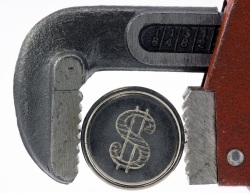My freelance philosophy is pretty simple. I don’t over-commit, but I do wake up at 5:30 every morning wondering how I’m going to get everything done. It all gets done, on time.
That sounds like I am a total workaholic, spending every waking moment of my day on projects, gigs, and with clients. But that’s not true. I spend plenty of time learning and attending classes. I also travel. But my workload is respectable and actually causes fear in the minds of less-busy people.
I’m happy with that.
The key is that I combine my interests with my work. I love collecting vinyl records, so I sell them online. This gives me a great excuse to buy more records. I love the internet, and a great deal of my work involves online research. I am addicted to cinema, recording, making music, and editing.
So I started working on independent film and video game projects in the Chicago area, doing location audio, sound effects capture, post-production and dialog editing.
To be fair, I have a background in these things. I didn’t start from scratch in media. But it’s not hard to learn what it takes and the world is full of independent film producers now. You can find a way in if you look hard enough. But having the persistence to stick out the lean times in that industry is the same as any other. A true freelancer finds a way to keep at it.
One of the most important things you can do as a freelancer is determine what kind of work you DO NOT want to be doing, and move away from it as soon as it’s financially possible. For some, that isn’t realistic for a variety of reasons. But you CAN work TOWARD doing that. It’s a financial tightrope, but as you become more skilled and confident in your work (and have results to show for it) you can make a determined move towards combining your interests and your work routine.
Joe Wallace is a freelance social media writer and audio professional based in Chicago. His recent projects include video game sound effects and music composition for Shedd Aquarium, location audio, dialog editing, and post-production for the web series Family Values, and location audio for the indie thriller Still. Wallace is set to release his own short independent film, 45 RPM, in early 2014.





